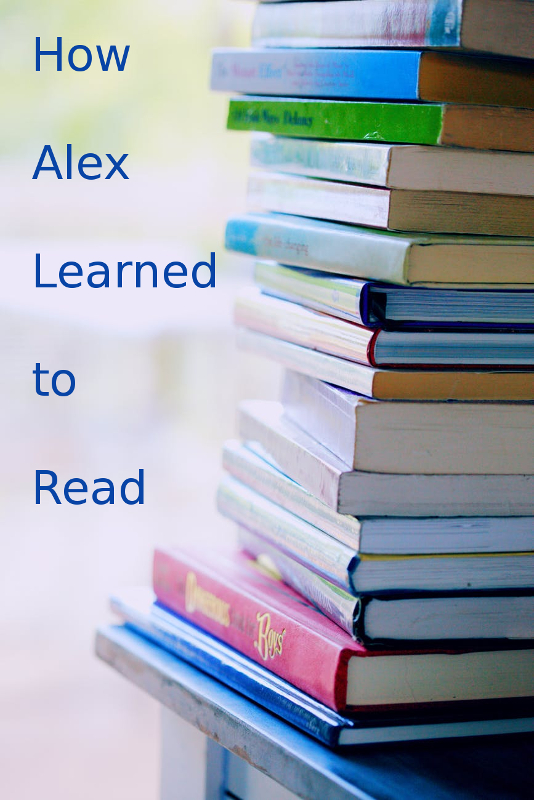This is part two of an article I wrote for an unschooling list. It was written to show how one child learned to read without the typical reading lessons.
This article was subsequently published in an issue of Live Free Learn Free magazine, back when they sent that magazine out in the mail.
If you haven't read part one yet, please go here to read it: Part One

by Cheryl Carroll
2005
A lot of Alex's time was spent watching and acting out movies and musicals, building with Legos, playing games on the computer, going to the playground, painting, drawing, and collecting things.
Except for writing stories and playing games on the computer, there was not a whole lot of reading related stuff he did. Of course his pen and paper were never far away as he didn't go through a day without writing or drawing something. When writing his stories, he would still ask how to spell words and ask me to point out the letters on his chart, so he would be sure he wrote the right one.
As with most children, many of the letters he wrote were backwards, but I never worried about that. I don't remember exactly why, but I began to believe that there was a reason his brain was seeing things that way, and I felt that if I tried to correct it, I would be messing around with things I didn't understand. So I left it at that.
He also wrote stories backwards. If he wrote them on separate pages, he would put them in a folder or staple them with page one in the back and the last page in front. If he used a notebook or pad, he always started in the back.
There were a few times when Alex voiced his desire to know how to read. Not to "learn", but to "know". Although I would always help him read whatever he needed to read, he still wanted to know how to do it himself.
When I could see this desire was actually his, I would assure him that he would learn if he wanted to. I would ask him if he wanted to try small words or learn sounds the letters made, but on the rare occasion he said yes, this would only last a minute (literally). He didn't want to be taught. He wanted to just "know".
When I could see the desire was brought about by a good intentioned friend or relative mentioning something to him, I would assure him that he didn't need to worry about pleasing anyone but himself. I would tell him that one reason school children were prompted to learn earlier was because most of their learning experiences involve books.
Another reason was it was simpler to teach thirty children reading at the same time, rather than individually when they were ready. I would tell him that nearly everyone around us was used to the way it was done in school. They didn't understand our way.
I'd been reading more and more about actual experiences of unschooled children, so I was able to let him know that many unschooled children didn't learn to read until much, much later. Luckily, Alex wasn't that concerned about what others said to him, so this wasn't a problem. For the most part, he didn't think twice about whether he could read or not. He had so many other things on his mind.
The computer games that taught reading got played more in these years than before. Still, he didn't play them much. They couldn't keep his interest. He would only play a few minutes at a time. After about age six, I don't think he ever played them. He never finished one.
Alex watched Between the Lions fairly often. He had an assortment of electronic toys with the alphabet and words. He started receiving Lego and Turtle magazines in the mail. And we were always adding books to our library.
I'm sure a great amount of the foundation needed to understand written words was acquired between the age of four and six. It can't be gauged because most of it probably went unnoticed in the course of his daily activities.
I know he thought about sounds and letters. Occasionally, he would come to me and ask if I knew things, like the letter "m" makes the "mmmmm" sound.
How Alex Learned to Read - Part Three
Free printables for multiplication, roman numerals, state capitals, parts of speech, and more.
Math exercises. Multiplication and roman numeral resources. Posters, charts, converters.
Quizzes including world capitals, presidents in order, the elements, state flags, and more.
Armour, castle games, recipes, quizzes, fashions, music, old world maps, medicine, and more.
Alphabet flash cards, printable high frequency words, and printable parts of speech chart.
Spanish numbers to 20 and the Korean alphabet. Printable flash cards and charts.
Science games and quizzes, posters, science experiments.
Free Experiment of the Week from Robert Kramp's Science Education Co.
Posters, printables, the Lifeboat Game, fifty states resources, quizzes.
Reading systems, flashcard, worksheet and test makers, game creators, percentage calculator, timeline template.
Grade school and accredited high school, online public schools, foundational phonics, more.
Stickfigure animations, build a web page and a website template for kids.
Printable guitar and keyboard charts, ukelele chords diagram.
Free books, posters, videos, software, kits, curriculum, courses.
We're finding the good out there and sharing it.
Easy extra money! Lots of info here.
Food intolerance, night flying wasps, and more.
Maille armor pictures, ninja and camouflage pictures, and more.
If you have comments, questions, or would like to report a broken link, please send an email to Cheryl at byclc@live.com
© 2000-2024 Nicholas Academy
site map | privacy policy | by CLC | Micro-Ways